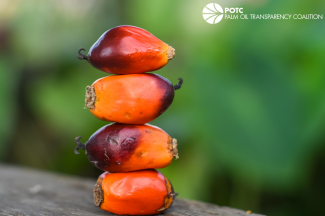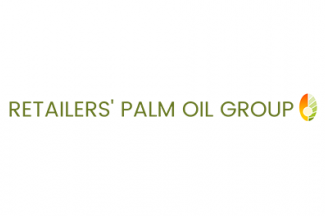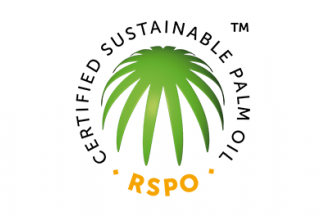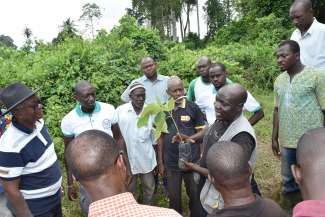
Palm Oil
Our Approach
Palm oil is used as a raw material in many food and non-food products, such as biscuits, detergents, candles and spreads. Palm oil has the highest yield compared to rapeseed, sunflower, or coconut oil, and is the most versatile and efficient oil with regard to consistency and durability. Despite these positive characteristics it is frequently criticised for causing deforestation of large areas of rainforest to make way for palm oil plantations.
In order to ensure sustainable palm oil production, we have been a member of the Roundtable on Sustainable Palm Oil (RSPO) since 2011. The RSPO’s standard covers deforestation and further environmental impacts, as well as social aspects such as land rights and labour standards.
We use sustainable RSPO-certified palm oil for 100% of our own label food and non-food products. Our engagement plan for palm is complemented by active memberships in several multi-stakeholder initiatives and a strategic approach to smallholder farmers.
Our Actions
Transparency & Traceability
Promoting transparency and increasing traceability are important steps towards our goal of eliminating deforestation within the palm supply chain. We believe that going beyond meeting our palm sustainability standards by working alongside business partners and other industry actors is an important step towards creating a more sustainable palm industry. Through our involvement in the Palm Oil Transparency Coalition (POTC) and our supplier survey, we are able to increase the visibility of our own palm oil supply chain.
Transparency project trial
In addition to our many years of commitment within the framework of the POTC, we have increased the traceability of the palm oil food and non-food supply chains through a supplier survey. Via this trial survey, we were able to trace approximately 50% of the palm oil used in our products back to the palm oil importer. One of our future priorities is to identify a higher percentage of palm oil importers and the volumes entering our supply chains. The surveyed supplier sample represents around 15% of the palm oil volumes of the ALDI SOUTH Group.
Certification
We use 100% RSPO-certified palm oil in all our own label food and non-food products. RSPO-certification ensures that palm oil used for ALDI products is produced in an environmentally friendly and socially responsible way. Palm oil producers are certified through strict verification of in the production process in line with the RSPO Principles & Criteria. In order to ensure that the palm oil used for our products has been produced sustainably, we rely on the RSPO Chain of Custody Standards. Each part of our supply chain needs to be certified and certified volumes are audited by an independent third party.
In order to better understand the complexity of a palm oil supply chain, it is displayed in a simplified way in the following graphic:

For commodities with complex supply chains, it is important to choose the most efficient tools to create impact on the ground: For palm oil, we collaborate pre-competitively with other businesses via the Palm Oil Transparency Coalition. POTC is formed of businesses that collaborate in a pre-competitive coalition to remove deforestation and exploitation from the palm oil production sector.
We aim to achieve this by using a robust engagement and evaluation process for measuring the progress of the major First Importers of palm oil into international markets.
Supply Chain
Supporting smallholders
Approximately 40% of the globally traded palm oil is produced by smallholders. Certification requirements often represent a barrier for smallholders to participate in global supply chains. The main reasons are the administrative burden and the cost linked to certification. Based on this knowledge, we developed an approach to include smallholders in the scope of our commitment:
- We purchase and accept RSPO Independent Smallholder Credits to support their work directly.
Trading RSPO Credits provides smallholders direct access to the RSPO premium for growing sustainable palm oil. Smallholders do not always have access to a certified mill, and so Independent Smallholder Credits are the only possibility for smallholders to benefit from an RSPO premium for growing certified palm.
Via our E-Learning, we inform suppliers about these framework conditions and encourage them to engage with smallholders. Also in exchange with actors further up the supply chain, such as traders, we underline the importance of integrating smallholder farmers in sustainable global palm oil supply chains. - We participate in the RSPO Smallholder Standing Committee as retail representative.
The aim is to empower smallholder farmers within the RSPO and engage in a platform that makes the palm oil market more sustainable. One of the major achievements of this group so far was the development of a smallholder palm oil standard. In this way, the availability of RSPO Independent Smallholder (I.S.) Credits can be increased. - We completed a smallholder project in Côte d'Ivoire alongside ALDI Nord and our partner Solidaridad, in order to pave the way for a sustainable cultivation of palm oil, focussing on the protection of native forests and environmentally sound cultivation methods.
Visits & Assessments
As part of our engagement, we regularly visit and assess production sites together with our business partners in our food and non-food supply chains.

Stakeholder Dialogue & Capacity Building
We believe the best way to protect the people and the environment is through joint initiatives and partnerships. For this reason, we engage in various multi-stakeholder initiatives and projects on the ground.
Project on the ground
Palm oil smallholder project (2017-2021)
Between 2017-2021, the ALDI SOUTH Group, together with ALDI Nord, supported a smallholder project in Côte d'Ivoire in order to pave the way for sustainable cultivation of palm in the area. In close cooperation with our partner Solidaridad, we developed a project that focused on improving smallholder farmers’ knowledge on Best Environmental Practices and on agriculture that respects High Conservation Values (HCV) and natural forests.
Solidaridad offered training through Farmer Field Schools (FFS) for 2,611 palm oil smallholder farmers and helped restore approximately 250 hectares of forest land in the project area. The team cultivated 17,532 tree seedlings in nurseries that were then distributed to individual farmers, planted in schools and borders of sacred forests, and used to help restore natural reserve areas.
Various partners and stakeholders were involved in the project, including the Inter-professional Association of Oil-Palm Industry (AIPH). This institution has fully endorsed the project’s outcomes and is now installing tree nurseries in other palm oil-growing regions. Additionally the cooperatives engaged are were COOPALEN, UCCOPES, COOPTOSA from the Sud Comoe region, UCOOPALM from the Grand Ponts region, USCOPAHLD from Loh Djiboua and U3SC from San Pedro.
Despite the many challenges facing the project, including COVID-19 restrictions, and political tensions, 90% of the community participants, including community leaders and the youth, reported positive outcomes of the project in the area and increased knowledge from the trainings.
Our CR Performance
Our Goal: All palm (kernel) oil and palm (kernel) oil-based derivatives and fractions used in our own-brand products are certified.
News
Sustainable Development Goals
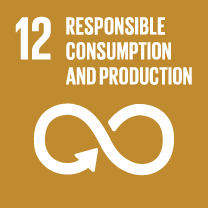



UNGC
Human Rights
Principle 1
Support and respect the protection of human rights
Principle 2
Not complicit in human rights abuses
Labour
Principle 3
Uphold freedom of association and recognition of right to collective bargaining
Principle 4
Elimination of forced and compulsory labour
Principle 5
Abolition of child labour
Principle 6
Elimination of discrimination in respect of employment and occupation
Environment
Principle 7
Precautionary approach to environmental challenges
Principle 8
Promote environmental responsibility
Principle 9
Development and diffusion of environmentally friendly technologies
